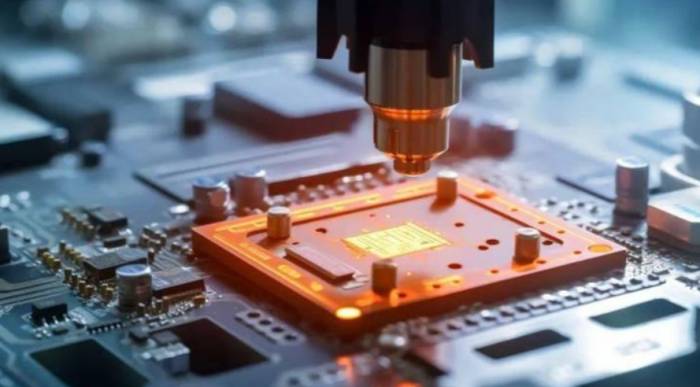On October 16th, the China Cyberspace Security Association issued a statement highlighting that Intel products have frequent security vulnerabilities, poor reliability, and under the guise of remote management, they actually monitor users and secretly set backdoors that endanger network and information security. The association suggested initiating a cybersecurity review of Intel's products sold in China to protect national security and the legitimate rights and interests of Chinese consumers.
The association stated that Intel, in collaboration with manufacturers such as HP, jointly designed the IPMI (Intelligent Platform Management Interface) technical specification, claiming it was for monitoring the physical health characteristics of servers. Technically, servers are managed and controlled through the BMC (Baseboard Management Controller) module. The BMC module allows users to remotely manage devices, and it has also been reported to have high-risk vulnerabilities, posing a significant security risk to a large number of servers worldwide due to the potential for attack and control.
Affected by this news, after the U.S. stock market opened on the 16th, Intel's stock price fell by 4% at one point, but then gradually recovered, still closing down by 1.54%. In today's A-share morning session, domestic CPU concept stocks strengthened, with Fullit (Fu Le De) hitting the daily limit, Loongson Technology (Long Xin Zhong Ke) surging by over 13%, and Cambricon, Sugon Information, HiSilicon Technologies, and SmartSens Technology (Si Te Wei) following suit.
Industry insiders told First Financial Daily reporters that cybersecurity is an important part of national security, and domestic companies already have corresponding technical solutions to replace products with multiple vulnerabilities like Intel's. However, regarding which of the company's CPU products can be benchmarked against Intel's products and form a replacement, First Financial Daily reporters made multiple calls to the securities representatives of Sugon Information and Loongson Technology, but they were not connected before press time.
What is the impact of Intel?
The China Cyberspace Security Association raised issues with Intel in the article, such as "frequent security vulnerabilities, poor reliability, monitoring users, and secretly setting backdoors." The association also stated that the U.S. government, through the so-called "CHIPS and Science Act," has groundlessly marginalized and suppressed China's semiconductor industry, with Intel being the biggest beneficiary of the act.
As of press time, Intel has not responded to the aforementioned issues.
As the world's largest CPU manufacturer, Intel has always been the leader in the PC and server markets.
Specifically, although competitors such as AMD have had some impact on Intel, Intel still holds a significant share of the PC market. According to Canalys data for the fourth quarter of 2023, Intel's PC processor shipments were about 50 million units, a year-on-year increase of 3%, with a market share as high as 78%; while AMD's processor shipments were about 8 million units during the same period, a year-on-year decrease of 1%, with a corresponding share of 13%.
In the server market, according to statistics from public institutions, Intel's share in the server CPU market is roughly around 65%.In data provided by the China Cyberspace Security Association, Intel's CPUs accounted for approximately 77% of the domestic desktop market and about 81% of the notebook market in 2021; in 2022, Intel's share of the x86 server market in China was around 91%. It can be said that Intel still holds the largest market share in China's PC and server CPU markets.
Furthermore, according to financial reports, Intel's total revenue for the fiscal year 2023 was about $54.2 billion, with revenue from the Chinese market contributing 27% of Intel's total revenue.
From an industry perspective, if subsequent events escalate, domestic partners may be required to stop purchasing products from Intel, which would further impact Intel's revenue in the Chinese market, especially against the backdrop of the company's current severe financial crisis, where the impact would be compounded.
Public information shows that the China Cyberspace Security Association was established in Beijing on March 25, 2016. It is a national, industry-wide, non-profit social organization under the supervision of the Central Cyberspace Affairs Office. The organization is divided into organizational members and individual members. As of September 2024, there were 627 organizational members and 326 individual members, including major domestic internet enterprises and cybersecurity companies, authoritative research institutions, and top experts in the field of cybersecurity.
The reporter attempted to contact the person in charge of the aforementioned association, but did not receive further response before press time.
However, some semiconductor insiders told the reporter that a review related to Intel may be underway, and some cooperation between the company and key Chinese customers has already been halted.
What is the impact on domestic CPU companies?
Affected by the news, on the morning of the 17th, the stock prices of some semiconductor stocks in the A-share market fluctuated. The domestic CPU manufacturer Hai Guang Information's stock price rose by more than 5% during the trading day, and Loongson Technology's stock price rose by more than 14%.
Institutions believe that in industries with higher requirements for information security, such as government departments, financial institutions, and telecommunications, there may be a greater tendency to choose domestic CPU chip products to reduce security risks, and domestic companies will have increased opportunities to replace in related markets. According to data from the Head Leopard Research Institute, the domestic CPU localization rate in China was 30%-40% in 2022.
At present, although Intel and AMD dominate the CPU market, a domestic CPU camp led by six major companies has gradually taken shape, namely Kunpeng, Phytium, Hai Guang, Zhaoxin, Loongson, and Shenwei. Among them, Kunpeng and Phytium follow the ARM instruction set route. Hai Guang and Zhaoxin follow the X86 instruction set route. Loongson was initially based on the MIPS instruction set but is now on the self-developed LoongArch instruction set route, while Shenwei was initially based on the Alpha instruction set but is now on the self-developed SW64 instruction set route. Among them, Hai Guang and Zhaoxin, which follow the X86 route, have attracted much attention from the outside world.According to the latest financial report from Hygon Information, in terms of CPU, the company has launched the 3000 series, 5000 series, and 7000 series, which are compatible with the x86 instruction set and mainstream operating systems and application software. According to a research report from Huaxin Securities, the CPU products have already reached cooperation with domestic leading server manufacturers, top financial institutions, and state-owned enterprises. In terms of DCU, it supports AI large model training and has been adapted to mainstream large models such as LLaMa, GPT, Wenxin Yiyan, ChatGLM, and Tongyi Qianwen.
For domestic X86 CPU manufacturers such as Hygon and Zhaoxin, because they belong to the Wintel alliance system, they can use the Wintel ecosystem, and the Windows ecosystem is perfect, there are no problems in use. Therefore, in some mid-to-low-end PC and server markets, they can realize the substitution of Intel CPUs. In the high-end market, there are also AMD products that can be replaced, and it will not cause too much impact on the construction and operation of domestic infrastructure that depends on high-end x86 CPUs.
Zhaoxin obtained the X86 architecture authorization through the acquisition of VIA, which allows it to design chips based on this mature architecture. At present, Zhaoxin is one of the few domestic manufacturers with core R&D capabilities in CPUs, GPUs, and chipsets. This means that it can independently carry out the design and development of processors, graphics processors, and chipsets, achieving full coverage of core chip technology processes.
The ecosystem of Loongson Technology is based on the LA instruction system. Loongson Technology is the only domestic CPU company that insists on building an independent ecosystem based on its own instruction system, separate from the Wintel system (Windows+Intel) and AA system (Android+Arm). The chips it has developed include the Loongson 1, Loongson 2, and Loongson 3 series of processor chips and supporting chips such as bridge chips.
However, it can also be seen that compared with international giants such as Intel and AMD, Zhaoxin still has a certain gap in technical strength. For example, in terms of single-core performance, some products of Zhaoxin still need to be improved, and its competitiveness in the high-end market and high-performance computing field is relatively weak. From a performance comparison, in 2023, Loongson Technology successfully produced a four-core general-purpose CPU Loongson 3A6000, which has reached the level of the 10th generation four-core Core. Intel's 10th generation Core U processor was released in 2019, and its processor has continued to iterate since then.
Loongson Technology admitted in its financial report for 2023 that CPUs have extremely high ecosystem barriers. The Wintel system started earlier and dominates the desktop and server markets. Most domestic CPU products are based on the X86 and ARM instruction systems, and the market share of CPUs supporting LA is still low at present.
CPU manufacturers need to catch up with Intel's technical level and market position, and there are other challenges to face.
For example, both Loongson Technology and Hygon Information are chip design companies, which are Fabless models, and the manufacturing process is outsourced. A senior semiconductor industry insider told reporters that whether the chip can be produced with advanced processes after design is also a problem. The development of domestic CPUs involves not only the design level but also whether the entire industry chain can support it.
In addition, including Hygon Information, domestic processor chip manufacturers such as Loongson Technology, Phytium, and Zhaoxin, their instruction sets come from the technical authorization of foreign companies, and there is also a risk of not being able to use the authorized technology. According to the prospectus of Hygon Information, the company obtained the technical authorization of high-end processors and related technical support from AMD. After the company was included in the "Entity List", AMD no longer provided related technical services. In the future, Hygon Information still has the risk of not being able to continue using authorized technology or not having enough mastery of high-end processor technology.
In addition to Hygon and Zhaoxin, the Kunpeng CPU of the Arm CPU camp is also expected to benefit. Public information shows that in the trusted computing field, Kunpeng CPU is currently among the top two in market share, and it is predicted that by 2024, it will account for more than 50% of the trusted computing server market. According to the relevant data in 2022, its share in the trusted computing server market is about 12%.A leading domestic computing power company told reporters that, catalyzed by AI, the domestication of the server computing power market has further increased. "By 2026, the domestic AI computing power localization ratio is expected to reach 50%, while this figure was only about 22% two years ago, and it is expected to reach 42% this year."
However, from the perspective of application scenarios, compared with Intel chips widely used in data centers and consumer electronics, domestic CPUs still have certain limitations.
In an article by the China Cybersecurity Association, Intel chips that have vulnerabilities or other issues include not only those used in data center servers, such as Xeon processors, but also Intel's 6th to 11th generation Core, Celeron, and Pentium series CPUs, as well as the 13th and 14th generation Core i9 series CPUs. This means that devices affected by vulnerabilities include not only data center servers but also consumer electronics like computers.
At present, the products of some domestic CPU manufacturers are mainly aimed at government and enterprise customers, not primarily at ordinary consumers. This means that it is still difficult for these domestic CPUs to quickly replace consumer electronics on the market that use Intel chips.
Among domestic CPU manufacturers, Loongson Technology is aimed at the traditional electronic government affairs market, and the company plans to enhance the competitiveness of Loongson CPUs in policy-driven markets. Higon Information's CPUs are mainly used in key industries or fields such as telecommunications, finance, the internet, education, and transportation. Higon Information's CPU-related products have been applied to financial and energy chemical field customers such as Industrial and Commercial Bank of China, Bank of China, PetroChina, and Sinopec, and have been used in data center business applications of telecom operators. "Fields with relatively high requirements for information security and supply chain security are the advantage markets for domestic CPUs," Higon Information stated in its 2023 financial report.
The above-mentioned semiconductor industry insiders told reporters that compared with some institutions or enterprise customers with high requirements for information security and a strong demand for replacing Intel and other CPU chips with domestic CPU chips, the consumer market is more market-oriented, and it is difficult to replace Intel chips with domestic CPUs in a short period of time.






























Share Your Thoughts
We value your insights and perspectives